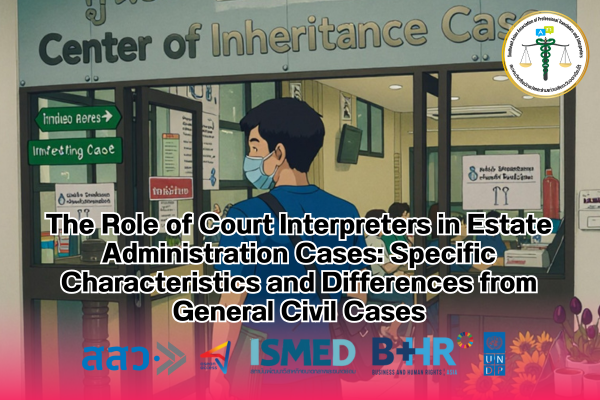The Role of Court Interpreters in Estate Administration Cases:
Specific Characteristics and Differences from General Civil Cases
Abstract
Court interpreters play a crucial role in ensuring access to justice for individuals who are not proficient in the language of legal proceedings. In Thailand, estate administration proceedings—classified as non-contentious cases—present distinctive challenges that differ significantly from adversarial civil litigation. This article examines the functions, linguistic responsibilities, and ethical considerations of interpreters in estate administration cases. Through comparative analysis, it explores how the interpreter’s role in such proceedings diverges from general civil cases and highlights the specialized skills required for accurate and empathetic communication within a sensitive legal and familial context.
Keywords: court interpreter, estate administration, civil procedure, non-contentious cases, legal interpreting, judicial ethics
1. Introduction
Court interpreters serve not merely as linguistic conduits but as communicative agents who must accurately convey intent, nuance, and context across languages (Berk-Seligson, 2002). In estate administration proceedings—classified under Thai law as non-contentious cases—the interpreter is often tasked with interpreting information related to inheritance rights, family relations, and official documentation. These cases frequently involve foreign nationals, overseas heirs, or documents in multiple languages. The interpreter must navigate legal terminology, cultural sensitivity, and emotional dynamics unique to post-mortem legal procedures.
2. Nature of Estate Administration Cases
According to Thailand’s Civil and Commercial Code (Section 1711 onwards), estate administration is a non-contentious judicial process wherein an interested party petitions the court to appoint an estate administrator or validate a will. Unlike typical civil disputes, these proceedings do not involve opposing parties. Interpreters typically work with the petitioner’s oral statements and supporting documents, such as birth certificates, house registration records, and wills, without adversarial questioning or cross-examination.
3. Key Differences in Interpreting Practice
| Aspect | Estate Administration | General Civil Cases |
|---|---|---|
| Type of case | Non-contentious (no opposing party) | Adversarial litigation |
| Interpreter’s function | Accurately convey personal data, relationships, and documents | Interpret questions, rebuttals, and legal arguments |
| Courtroom atmosphere | Generally calm and cooperative | Often tense and confrontational |
| Emotional sensitivity | Interpreting amid grief and family dynamics | Interpreting in the context of legal conflict |
| Linguistic accuracy | Emphasis on names, addresses, lineage, and official documents | Emphasis on legal reasoning, argumentation, and intent |
(Sources: Hale, 2007; Judicial Training Institute, 2021)
4. Specialized Skills Required of Interpreters in Estate Cases
Estate cases require interpreters to demonstrate specific legal and linguistic competencies, including:
- Legal knowledge in family and inheritance law: Familiarity with terms such as “lawful heir,” “probate,” or “testamentary executor”
- Understanding kinship and legal relationships: Accurately interpreting terms like “adopted child,” “maternal uncle,” or “half-sibling”
- High precision in names and documents: Especially when transliterating between Thai script and Roman alphabets
- Ethical sensitivity and confidentiality: Interpreters must respect the privacy of family matters, financial information, and the contents of wills
5. Recommendations for Professional Practice
To enhance the quality of court interpreting in estate administration, the following measures are proposed:
- Specialized training programs in inheritance law and family relationships
- Establishment of interpreting protocols for non-contentious cases
Improved coordination between courts and interpreters, including prior access to case materials and documents
6. Conclusion
The role of the interpreter in estate administration cases extends beyond language transmission. It involves legal awareness, precision in identity and kinship data, and emotional intelligence. While such cases may lack legal confrontation, they demand a high degree of professionalism to ensure justice and clarity in deeply personal and sensitive legal matters.
References
- Berk-Seligson, S. (2002). The bilingual courtroom: Court interpreters in the judicial process. University of Chicago Press.
- Hale, S. (2007). Community interpreting. Palgrave Macmillan.
- Judicial Training Institute, Office of the Judiciary. (2021). Judicial Practice Manual: Civil Procedure, Volume 1 (in Thai). Bangkok: Office of the Judiciary Press.
- Civil and Commercial Code. (2022). Bangkok: Office of the Council of State.
SEAProTI’s certified translators, translation certification providers, and certified interpreters:
The Southeast Asian Association of Professional Translators and Interpreters (SEAProTI) has officially announced the criteria and qualifications for individuals to register as “Certified Translators,” “Translation Certification Providers,” and “Certified Interpreters” under the association’s regulations. These guidelines are detailed in Sections 9 and 10 of the Royal Thai Government Gazette, issued by the Secretariat of the Cabinet under the Office of the Prime Minister of the Kingdom of Thailand, dated July 25, 2024, Volume 141, Part 66 Ng, Page 100. the Royal Thai Government Gazette
บทบาทของล่ามในคดีจัดการมรดก: ลักษณะเฉพาะและความแตกต่างจากคดีแพ่งทั่วไป
บทคัดย่อ
ล่ามในกระบวนการยุติธรรมมีบทบาทสำคัญในการอำนวยความยุติธรรมให้แก่ผู้ที่ไม่สามารถใช้ภาษาไทยได้อย่างมีประสิทธิภาพ โดยเฉพาะในคดีที่มิใช่คดีพิพาท เช่น คดีจัดการมรดก ซึ่งมีลักษณะเฉพาะแตกต่างจากคดีแพ่งทั่วไป บทความนี้ศึกษาบทบาท หน้าที่ และลักษณะการปฏิบัติงานของล่ามในคดีจัดการมรดก โดยเปรียบเทียบกับคดีแพ่งทั่วไป วิเคราะห์ทักษะเฉพาะที่จำเป็น รวมถึงข้อควรระวังเชิงจริยธรรมและภาษาศาสตร์ เพื่อเสนอแนวทางพัฒนาแนวปฏิบัติและมาตรฐานของล่ามในศาล
คำสำคัญ: ล่ามศาล, คดีจัดการมรดก, คดีแพ่ง, ความยุติธรรม, การแปลในกระบวนการยุติธรรม
1. บทนำ
บทบาทของล่ามในศาลมิได้จำกัดอยู่เพียงการแปลถ้อยคำ แต่รวมถึงการถ่ายทอดเจตนารมณ์ ความรู้สึก และบริบททางวัฒนธรรมของผู้พูดอย่างถูกต้องครบถ้วน (Berk-Seligson, 2002) โดยเฉพาะในคดีจัดการมรดก ซึ่งมีลักษณะเป็นคดีที่มิใช่คดีพิพาท (non-contentious case) ล่ามต้องปฏิบัติหน้าที่ภายใต้บริบทของความอ่อนไหวในครอบครัว เอกสารทางราชการ และข้อกฎหมายเกี่ยวกับสิทธิในการสืบมรดก
2. ลักษณะของคดีจัดการมรดก
ตามประมวลกฎหมายแพ่งและพาณิชย์ มาตรา 1711 เป็นต้นไป คดีจัดการมรดกเป็นการร้องขอต่อศาลเพื่อขอให้ตั้งผู้จัดการมรดก หรือตีความพินัยกรรม ซึ่งต่างจากคดีแพ่งทั่วไปที่เป็นข้อพิพาทระหว่างคู่ความ ในกรณีนี้ ล่ามมักแปลคำร้อง คำให้การ และเอกสารสำคัญ เช่น สูติบัตร ทะเบียนบ้าน หรือพินัยกรรม โดยไม่มีการซักค้านหรือโต้แย้ง
3. ความแตกต่างในการปฏิบัติงานของล่าม
| ประเด็น | คดีจัดการมรดก | คดีแพ่งทั่วไป |
|---|---|---|
| ลักษณะคดี | มิใช่คดีพิพาท (ไม่มีฝ่ายตรงข้าม) | เป็นคดีพิพาท มีคู่ความสองฝ่าย |
| บทบาทของล่าม | ถ่ายทอดถ้อยคำอย่างเป็นกลาง เน้นความถูกต้องของข้อมูลบุคคล เอกสาร และเครือญาติ | แปลการโต้แย้ง การซักค้าน และถ้อยคำที่มีนัยสำคัญทางกฎหมาย |
| บรรยากาศในศาล | เป็นมิตร ไม่เคร่งเครียด มักไม่มีการคัดค้าน | เคร่งเครียดจากการต่อสู้คดี |
| อารมณ์ของผู้พูด | มีความอ่อนไหวทางจิตใจจากการสูญเสีย | มีความขัดแย้งหรือผลประโยชน์ระหว่างคู่ความ |
| ความละเอียดทางภาษา | ต้องแม่นยำเรื่องชื่อ ที่อยู่ สายสัมพันธ์ และเอกสารทางราชการ | ต้องเข้าใจถ้อยคำเชิงกฎหมายและประเด็นข้อเท็จจริง |
(อ้างอิง: Hale, 2007; ศูนย์ฝึกอบรมตุลาการ, 2564)
4. ทักษะเฉพาะของล่ามในคดีมรดก
ล่ามในคดีมรดกต้องมีทักษะพิเศษ ดังนี้
- ความรู้ด้านกฎหมายครอบครัวและมรดก: เพื่อให้เข้าใจเจตนารมณ์ของผู้ร้อง เช่น คำว่า “บุตรโดยชอบด้วยกฎหมาย” หรือ “พินัยกรรมที่ทำขึ้นโดยพิเศษ”
- ความสามารถในการถ่ายทอดความสัมพันธ์เครือญาติ: เช่น บุตรบุญธรรม ญาติทางฝ่ายมารดา หรือพี่น้องร่วมบิดามารดาเดียวกัน
- ความแม่นยำของการแปลชื่อบุคคลและเอกสาร: เนื่องจากเอกสารราชการไทยใช้อักษรไทย ส่วนเอกสารต่างประเทศอาจใช้อักษรโรมัน ล่ามต้องตรวจสอบความสอดคล้องกัน
จริยธรรมวิชาชีพ: รักษาความลับของครอบครัว ข้อมูลส่วนตัว และเนื้อหาของพินัยกรรม
5. ข้อเสนอเพื่อการพัฒนา
เพื่อยกระดับมาตรฐานการทำหน้าที่ของล่ามในคดีมรดก ควรมีการดำเนินการดังนี้:
- จัดอบรมเฉพาะทาง สำหรับล่ามด้านกฎหมายครอบครัวและมรดก
- กำหนดแนวทางปฏิบัติ (protocol) สำหรับล่ามในคดีที่มิใช่คดีพิพาท
- ส่งเสริมการทำงานร่วมกันระหว่างศาลและล่าม โดยให้ข้อมูลล่วงหน้าเกี่ยวกับเอกสารที่เกี่ยวข้อง
6. บทสรุป
ล่ามในคดีจัดการมรดกมีบทบาทที่ละเอียดอ่อนและซับซ้อนกว่าที่ปรากฏในภาพรวมของคดีแพ่งทั่วไป แม้ไม่มีการโต้แย้งกันในทางกฎหมาย แต่ล่ามต้องมีความรู้ด้านกฎหมาย ความสามารถทางภาษา และจริยธรรมวิชาชีพในระดับสูงเพื่อให้การสื่อสารในศาลเป็นไปอย่างมีประสิทธิภาพและยุติธรรม
เอกสารอ้างอิง
- Berk-Seligson, S. (2002). The bilingual courtroom: Court interpreters in the judicial process. University of Chicago Press.
- Hale, S. (2007). Community interpreting. Palgrave Macmillan.
- ศูนย์ฝึกอบรมตุลาการ สำนักงานศาลยุติธรรม. (2564). คู่มือปฏิบัติราชการของตุลาการ: วิธีพิจารณาความแพ่ง เล่ม 1. กรุงเทพฯ: โรงพิมพ์สำนักงานศาลยุติธรรม.
- ประมวลกฎหมายแพ่งและพาณิชย์. (2565). กรุงเทพมหานคร: สำนักพิมพ์สำนักงานคณะกรรมการกฤษฎีกา.
เกี่ยวกับนักแปลรับรอง ผู้รับรองการแปล และล่ามรับรองของสมาคมวิชาชีพนักแปลและล่ามแห่งเอเชียตะวันออกเฉียงใต้
สมาคมวิชาชีพนักแปลและล่ามแห่งเอเชียตะวันออกเฉียงใต้ (SEAProTI) ได้ประกาศหลักเกณฑ์และคุณสมบัติผู้ที่ขึ้นทะเบียนเป็น “นักแปลรับรอง (Certified Translators) และผู้รับรองการแปล (Translation Certification Providers) และล่ามรับรอง (Certified Interpreters)” ของสมาคม หมวดที่ 9 และหมวดที่ 10 ในราชกิจจานุเบกษา ของสำนักเลขาธิการคณะรัฐมนตรี ในสำนักนายกรัฐมนตรี แห่งราชอาณาจักรไทย ลงวันที่ 25 ก.ค. 2567 เล่มที่ 141 ตอนที่ 66 ง หน้า 100 อ่านฉบับเต็มได้ที่: นักแปลรับรอง ผู้รับรองการแปล และล่ามรับรอง

























